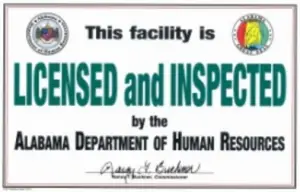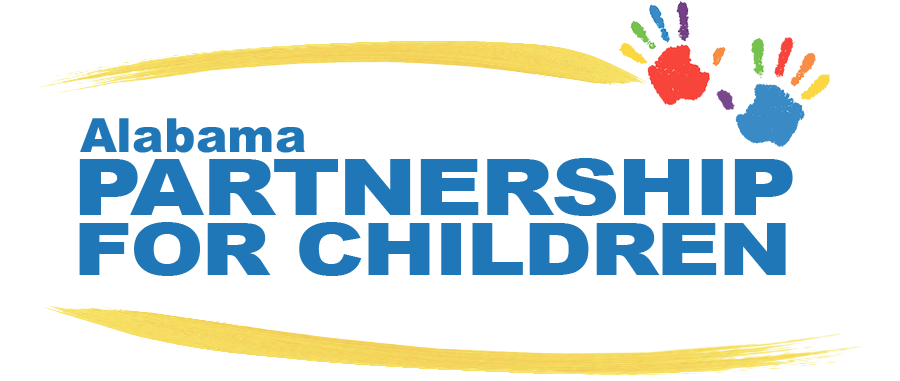Licensed vs. Licensed Exempt Child Care
LICENSED CHILD CARE
Child care centers and family child care homes in Alabama are licensed by the Alabama Department of Human Resources (DHR) with renewal every two years. Before a child care program is issued a license, it must submit a written fire and health department inspection report with no violations cited and zoning approval. The licensing process includes an annual, unannounced inspection by a trained professional from DHR to inspect all areas of the program to ensure that the Minimum Standards for Day Care Centers and Nighttime Centers are being met. The inspection includes the child care program showing proof of the required documentation in the Minimum Standards including staff criminal background checks, staff-to-child ratios, and First Aid and CPR training, as well as inspecting the facility and grounds.
As long as a child care program is licensed, it must display the current license and latest evaluation report in a prominent place. Many programs display an easy-to-read sign provided by DHR to inform parents that they meet the Minimum Standards. The purpose of licensing and inspection is to ensure the parent that their child is in a safe environment that will support their growth and development; however, Alabama is one of a few states that allows some child care programs to legally operate without a license or inspection.
LICENSED EXEMPT CHILD CARE
Since the passage of The Child Care Safety Act in 2019, the number of un-licensed child care centers in in Alabama dropped from 206 to less than 30. Currently there are about 1,950 licensed facilities and just over 530 that are license exempt (Alabama Department of Human Resources data). There are also still too many child care centers operating that are un-inspected and unregulated.
Faith-based license exempt facilities are defined by DHR as preschool programs which are an integral part of a local church ministry or a religious nonprofit elementary school, and are so recognized in the church or school’s documents, are not required to be licensed by DHR unless they are receiving state or federal funding for children in their care. Additionally, these facilities must have submitted the required documents to DHR and have received a letter of exemption that must be re-applied for each year. New license exempt facilities must be inspected before opening.
Other exempt facilities are those governmental agencies and/or organizations that come under the oversight of another government entity. Additionally, providers whose program is less than 4 hours a day are exempted.
There are also for-profit programs that are exempt from licensure, including: Kindergartens/nursery schools/daytime programs operated by public elementary systems, secondary level school units, or institutions of higher learning. Kindergartens or nursery schools or other daytime programs operated by public elementary systems or secondary level school units or institutions of higher learning; Kindergartens or nursery schools or other daytime programs, with or without stated educational purposes, operating no more than four hours a day and receiving children younger than lawful school age; Kindergartens or nursery schools or other daytime programs operated as a part of a private school and receiving children younger than lawful school age for four hours a day or less, with or without stated educational purposes; Facilities operated for more than four hours a day in connection with a shopping center or service or other similar facility, where transient children are cared for temporarily while parents or custodians of the children are occupied on the premises or are in the immediate vicinity and readily available; provided, however, that such facilities shall meet local and state fire and health requirements; Any type of day care center that is conducted on federal government premises; or Special activities programs for children of lawful school age including, but not limited to, athletics, crafts instruction and similar activities conducted on an organized and periodic basis by civic, charitable and governmental organizations; provided, however, that local and state fire and health requirements are met.
Unlicensed facilities are those facilities that have not notified DHR that they are operating a child care business illegally. Child day care centers in Alabama legally operate in one of two ways: Licensed or License Exempt.
Before the 2019 Act, child care centers that were “EXEMPT” from licensing meant that they were not required to meet the Minimum Standards for Day Care Centers and Nighttime Centers including staff criminal background checks, staff-to-child ratios, and First Aid and CPR training. In other words, exempt child care centers were not annually inspected by DHR or required to submit documentation of a fire and health department inspection in accordance with the state and local fire and health requirements. The only exceptions were in Jefferson and Mobile County where the health departments inspected for health and safety issues.
Since the CCSA passed, a lot of these requirements have become relevant to license exempt facilities, like they now must have fire and health inspections, provide copies of inspection reports showing compliance, conduct criminal background checks on all employees, provide proof of liability insurance, and are subject to investigations for any and all types of reported complaints.
Some more common exempt child care programs include:
- A program that is an integral part of a church ministry or a religious nonprofit elementary school
- A program that cares for children for four hours or less per day
- A program that is operated by another governmental agency such as a public school or military base
There is a common misunderstanding that state licensing can prevent a faith-based child care program from teaching religious concepts, but this is not the case! State licensing focuses on health and safety concerns in child care programs. There are many faith-based child care programs throughout Alabama that choose to be licensed and inspected to promote the health, safety, and well-being of the children enrolled while incorporating their faith-based mission into the child care program.






